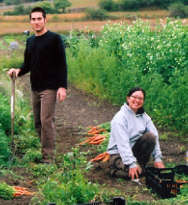
Everybody’s doing it The New York Times reports that many more students this year are looking for rural internships – gardening and organic farming are top of their list. (Some links to farm work apprenticeships are on the next page)
Erin Axelrod will be living in a tent, using an outdoor composting toilet and harvesting vegetables on a farm near Petaluma, Calif.
Gina Runfola, an English and creative writing student, was selected from over 20 applicants to intern at 3-Corner Field Farm in Shushan, N.Y.
Ms. Runfola, who grew up on the Jersey Shore and has never even gone camping, will plot her next move from a small trailer parked a half a city block away from the Internet connection in the main farmhouse.
If you want to try farm working contact Willing workers on Organic farms (WWOOF) or Farm Apprenticeships.

Click to buy from Amazon The volunteers are part of a new wave of liberal arts students who are heading to farms as interns this summer, in search of both work, even if it might pay next to nothing, and social change.
A few hope to run their own farms. Others plan to work on changing government food policy. Some are just looking for a break from the rigors of academia. But whatever the reason, the interest in summer farm work among college students has never been as high, according to dozens of farmers, university professors and people who coordinate agricultural apprenticeships.
Andrew Marshall, who began organizing apprenticeships for the Maine Organic Farmers and Gardeners Association in 2003, used to see an average of 75 applications a year. This season, he has fielded over 200, with more coming in every day.
Katherine L. Adam, who runs the National Sustainable Agriculture Information Service, financed by the Department of Agriculture, said 1,400 farms sought interns this year, almost triple the number two years ago. The number of small farms, which attract the new agrarians and can use the cheap, enthusiastic help, has grown sharply since 2003, according to the department.
Some students say food is the political movement of their time. “I no longer wish I was born in the ’60s,” said Mr. Katz, 20, who discovered farming as an outgrowth of his interest in environmental issues.
But food policy is much more personal than deforestation or global warming. “Everyone eats, and everyone has a vested interest in this,” he said.
About a third of the new agrarians will receive college credit.
For many students, farm life is a way to act on the growing enthusiasm for locally raised food and the increased concern over food safety and the environmental impact of agriculture.
Dru Rivers has had more than 150 people fill out the online application to be one of four interns working her 200 acres of organic fruits and vegetables at Full Belly Farm in Northern California. That is three times as many as last year.
Ms. Rivers, who began farming organically 25 years ago, said her generation had inspired the next.
Alex Liebman, 19, is part of that new wave. He is taking a leave from working on his biology degree at Macalester College in St. Paul to spend a year at Full Belly Farm.
His parents, who raised him in Holyoke, Mass., are environmentalists and supporters of local agriculture. His father would refuse to drive him to soccer practice because he thought using a car to travel somewhere to exercise was ridiculous.
This will be Mr. Liebman’s third farm internship. He has come to love the muscle fatigue that sets in at the end of a day. The rhythm of farm life is a welcome break from cellphones and Facebook. And the work makes him feel as if he is doing something to better the world.
“I’m not sure that I can affect how messed up poverty is in Africa or change politics in Washington,” he said, “but on the farm I can see the fruits of my labor.”
“By actually waking up every day and working in the field and putting my principles into action, I am making a conscious political decision,” he added.
Sometimes, the interns can get a little too political. Recently, an intern in Florida wanted to report her organic farmer for using antibiotics on sick sheep. Under national organic regulations, that is permitted as long as the treated animal is separated from the herd — a fact the young agrarian did not know.
She called Ms. Adam, who set her straight. “She thought the farmer wasn’t P.C. enough,” Ms. Adam said. “A lot of these students are very idealistic in terms of farming.”
Rick and Kristie Knoll, who for 30 years have worked a 10-acre plot in Brentwood, Calif., used to hire interns who were eager to be part of a farm that supplies restaurants like Chez Panisse. But it got to be too much work.
“These are kids who are not used to living in a small trailer or doing any kind of work,” Ms. Knoll said. “Most of them are privileged and think they want to try something new. They need structure. We need farmhands.”
One Response
This is wonderful. This couldn’t come at a better time. It’s important to know how to grow food organically & sustainably. It’s time we all take it back from the large agro farming industry who are using chemicals and hybrid gmo seed & selling tasteless, lifeless vegetables to superstores. If more and more people grow on their own farms and in backyards we will not have to depend on stores for fruit,vegetables, nuts and a lot more. Our health will be better and we will rely less on doctors and drugs. We can live on less money because we will be feeding ourselves. My kids were raised to work in our small family garden growing organically, and now that they live on their own they want a break from that life, but it’s in their genes and I’m hopeful they will go back to that lifestyle.